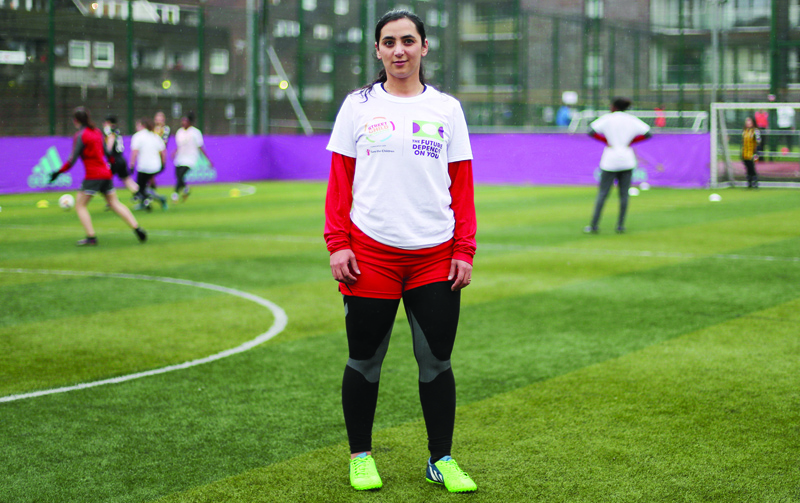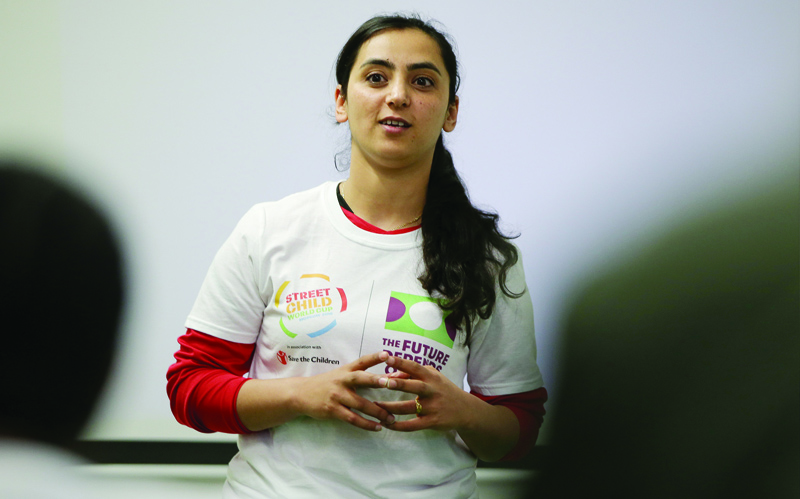 LONDON: In this file photo taken on April 09, 2018, former Afghanistan women's football captain Khalida Popal attends a training session in south London. - AFP photos
LONDON: In this file photo taken on April 09, 2018, former Afghanistan women's football captain Khalida Popal attends a training session in south London. - AFP photos
LONDON: Afghanistan's former women's football captain Khalida Popal said she worries about the safety of the country's female players have left her unable to sleep since the Taleban returned to power. Popal, 34, was granted asylum in Denmark in 2016, and considers herself "privileged" not to have to now seek safe haven from the hardline Islamists.
The team which Popal helped create in 2007 is made up of foreign- and Afghanistan-based players, with the threat of reprisals against those still in the country high given their previous high-profile criticisms of the regime. Gunmen are already being sent house to house searching for "enemies", she said, despite the group's attempt to ease concerns of a return to brutal oppression.
Her own family in the western city of Herat have already recounted a change, she said. "Women family members of mine that have been out in the street have either been told to turn round and go home and not go to school or been beaten," she told AFP by phone from Copenhagen.
 In this file photo taken on April 09, 2018, former Afghanistan women's football captain Khalida Popal speaks during a motivational session with young women in south London.
In this file photo taken on April 09, 2018, former Afghanistan women's football captain Khalida Popal speaks during a motivational session with young women in south London.
No protection
But Popal, who is now the women's team director, said the women footballers risk far worse. "I was one of the main people in the Afghan association who founded the women's team with the purpose to stand together as women of Afghanistan and use football as an avenue of activism," she said.
"We wanted to give the message to the world and to the Taleban that we (women) are not weak, you may kill our sisters but we will show you we are with them. These are young girls who went on social media and publicly said the Taleban was the enemy. My players are now seeing that armed enemy outside their doors and windows and they are scared as to what will happen to them."
Popal described the situation as "heartbreaking" and said players were struggling to understand how they had been left by the pull-out of US-led international forces. "When they call me or send voice messages to me they are saying, 'Why have they (the West) betrayed us? Why have politicians abandoned the women of Afghanistan? What have we done wrong?'" she said.
With access to Kabul airport blocked and also unlikely the players would be accepted for immediate evacuation, Popal said help for them within the country is not evident either. "At the moment those players living in the country are moving from one spot to another," she said. "The scary thing is nobody wants to give them protection because the Taleban are striking fear into them saying, 'If you do not give us information and identify who are against us then you and your family will be killed'."
'The dreams are fading'
Popal said she faced sexism when she was finance officer for the national football association: some men refused to accept their pay cheques from her due to her being a woman. But she said that was nothing compared to life for women under the Taleban from 1996 until they were ousted after the September 11, 2001 attacks in the United States. The Taleban said on Tuesday they would respect women's rights and permit them to be educated and work, albeit under Sharia law. But Popal said those were "just empty, empty words".
"When they announce that it will be under Sharia law, well, we have seen what that means for women already in the past in Afghanistan and in other countries too," she added. "If they are following Sharia law then that gives no rights to women whatsoever. All these achievements and dreams (for women) are fading away." Popal said it was hard to believe that history is repeating itself two decades on, describing it as "traumatizing to see my childhood repeating before my eyes".
"I was a child when the Taleban took over and I was told not to go outside and play in the street or go to school which was burned down by the Taleban eventually. When the Taleban started beating my father and threatening my family we left and for almost eight years we were in Pakistan refugee camps. "Then we went back to Afghanistan as there was hope of a new Afghanistan. However, empty and fake promises were made and the country once again is left alone and back to square one, and women are without any protection." - AFP
.jpg)



